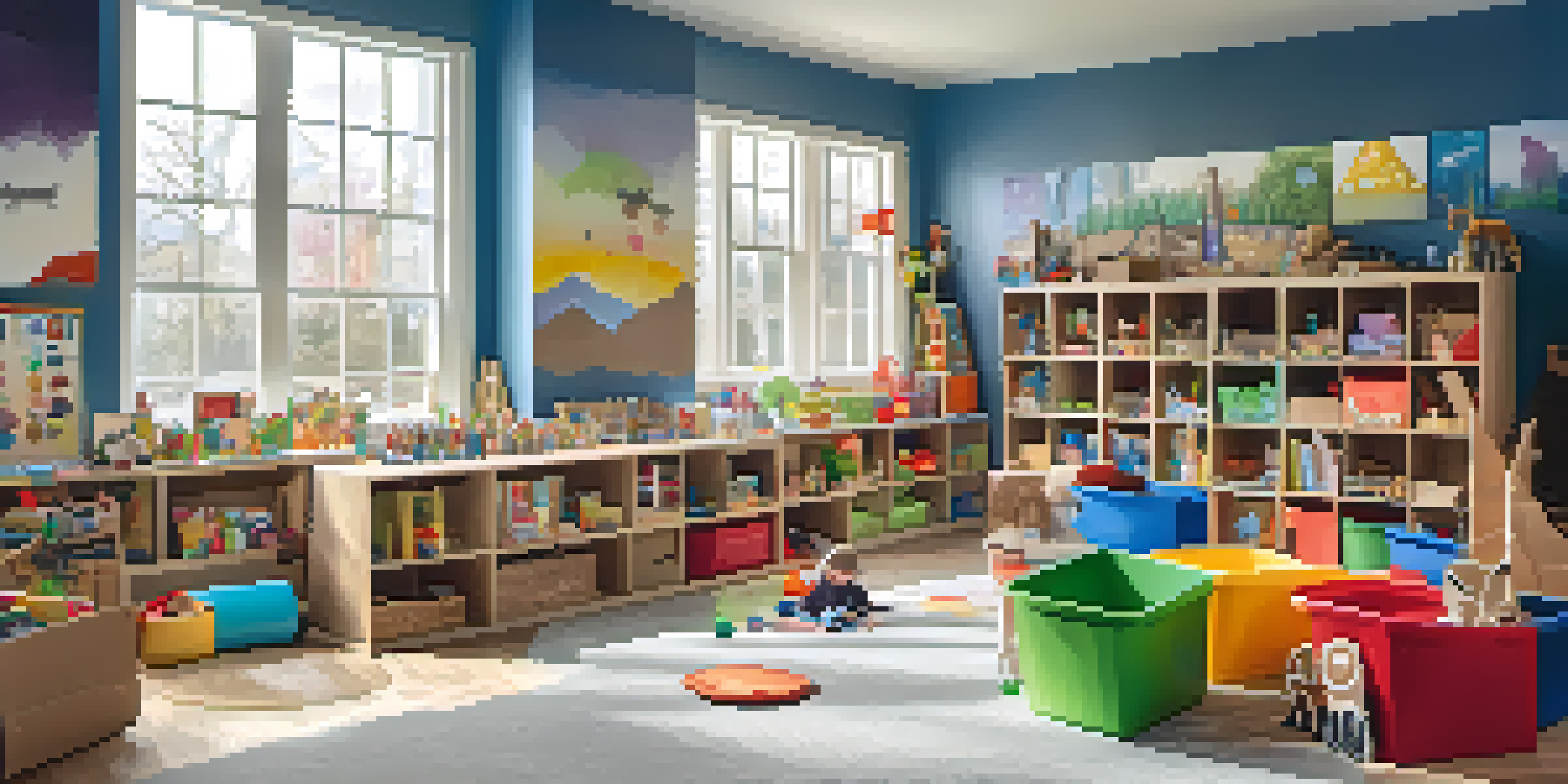How to Encourage Imaginative Play in Children

Understanding the Importance of Imaginative Play
Imaginative play is essential for children as it fosters creativity and cognitive development. It allows kids to explore different scenarios, enhancing their problem-solving skills. Moreover, engaging in pretend play helps children process their emotions and understand the world around them.
Play is the highest form of research.
When children immerse themselves in imaginative play, they learn to express themselves and communicate more effectively. This form of play is not only fun but also critical for social skills, as it often involves collaboration with peers. By encouraging this type of play, parents lay the groundwork for their child's future learning.
Research shows that imaginative play can lead to better academic performance later on. It nurtures curiosity and a love for learning, making children more eager to explore new ideas. Understanding the importance of imaginative play is the first step toward encouraging it in your child.
Creating a Playful Environment at Home
To encourage imaginative play, it's vital to create a conducive environment at home. This means designating a play space where children can freely express themselves without the fear of making a mess. Consider using colorful bins for toys or art supplies to make the area inviting and organized.

Incorporating open-ended materials like cardboard boxes, fabrics, and art supplies can spark creativity. Unlike traditional toys that have a single purpose, these materials allow children to invent their own games and stories. This kind of flexibility is key to nurturing their imagination.
Imaginative Play Boosts Development
Engaging in imaginative play fosters creativity, problem-solving skills, and emotional understanding in children.
Additionally, limit screen time to ensure children have more opportunities for creative play. Encourage them to use their imagination instead of relying on digital entertainment. A playful environment empowers children to explore their ideas and unleash their creativity.
Encouraging Role-Playing and Dress-Up Games
Role-playing and dress-up games are excellent ways to stimulate a child's imagination. Provide costumes and props that enable them to step into different roles, whether it’s a superhero, a chef, or an animal. This type of play encourages storytelling and helps children develop empathy by exploring perspectives different from their own.
Imagination is more important than knowledge. For knowledge is limited, whereas imagination embraces the entire world, stimulating progress, giving birth to evolution.
You can take it a step further by joining in on the fun. When parents participate in role-playing, it not only strengthens the bond between parent and child but also adds an element of collaboration. Together, you can create unique adventures, making the experience even more enriching.
Remember, the goal is to let children lead these imaginative scenarios. Avoid imposing strict rules; instead, allow them to dictate the storylines. This freedom will boost their confidence and encourage them to think outside the box.
Incorporating Storytelling into Playtime
Storytelling is a wonderful way to inspire imaginative play. You can read books together, then encourage your child to create their own stories based on the characters or settings. This not only improves their language skills but also nurtures their creativity and ability to construct narratives.
Consider asking open-ended questions while reading, such as, 'What do you think happens next?' or 'How would you feel if you were in this story?' These prompts encourage children to think critically and express their thoughts, making storytelling an interactive experience.
Create a Playful Home Environment
Designating a play space and providing open-ended materials can encourage children to explore their imagination freely.
You can also create a storytelling routine, perhaps during bedtime or family gatherings. This practice can turn into an enjoyable tradition that fuels your child's imagination and strengthens family bonds.
Utilizing Nature to Spark Imaginative Play
Nature is a fantastic backdrop for imaginative play. Outdoor environments provide endless opportunities for exploration, from building forts with sticks to pretending to be explorers in a jungle. Encourage your child to interact with nature, as it can ignite their creativity in unique ways.
Take nature walks together and ask them to observe and describe what they see. Challenge them to create stories based on their surroundings or to imagine they are characters in a magical world. This not only enhances their imaginative skills but also fosters a love for the outdoors.
Incorporating elements of nature into play can also be as simple as gathering leaves, rocks, or flowers for craft projects. These natural materials can serve as inspiration for countless imaginative scenarios and creations.
Encouraging Collaboration with Other Children
Imaginative play is often amplified when children collaborate with their peers. Organize playdates or group activities that encourage teamwork, allowing kids to create stories and scenarios together. This interaction not only enhances their social skills but also broadens their imaginative horizons.
Group play can introduce children to new ideas and perspectives, fostering a sense of community. When they work together, they learn valuable lessons about compromise and negotiation, which are essential life skills. It’s a win-win situation where their creativity flourishes while building friendships.
Collaboration Enhances Creativity
When children engage in imaginative play with peers, they expand their social skills and creative thinking through teamwork.
You can also encourage children to put on plays or puppet shows together. This collaborative effort not only enhances their storytelling abilities but also allows them to share their imaginative creations with others, boosting their confidence.
Setting Aside Time for Unstructured Play
In our busy lives, it’s important to carve out time for unstructured play. Unlike scheduled activities, unstructured play allows children the freedom to explore their interests without any limitations. This type of play fosters independence and creativity, enabling them to engage in their imaginations fully.
Make it a priority to have regular playtime that isn’t dictated by adults. Whether it’s a few hours on a weekend or a daily routine, this time should be free from screens and structured activities. Letting them play on their own terms can lead to surprising and delightful outcomes.

As parents, trust in your child's ability to entertain themselves. It might feel uncomfortable at first, but giving them space to create their own games will help them develop their imaginative skills and self-sufficiency.